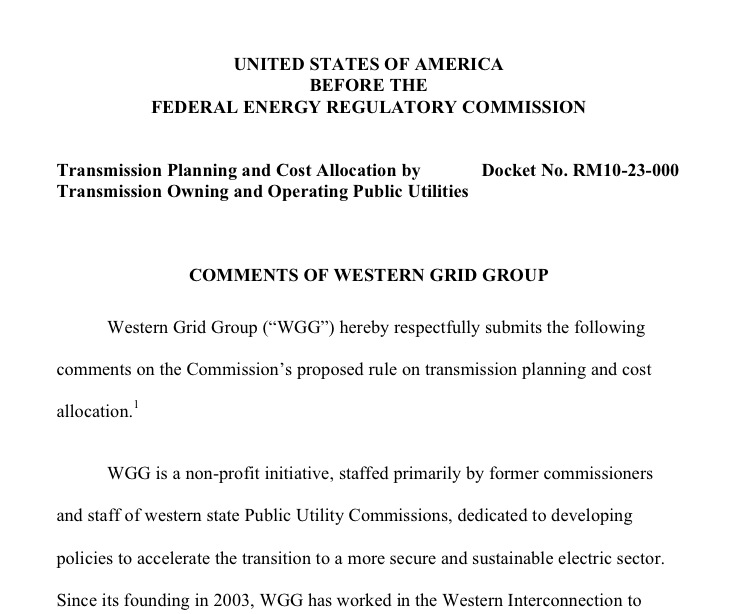WGG Comments on FERC Notice of Proposed Rulemaking on Transmission Planning and Cost Allocation
September 25, 2010
UNITED STATES OF AMERICA BEFORE THE FEDERAL ENERGY REGULATORY COMMISSION
Transmission Planning and Cost Allocation by Docket No. RM10-23-000 Transmission Owning and Operating Public Utilities
COMMENTS OF WESTERN GRID GROUP
Western Grid Group (“WGG”) hereby respectfully submits the following comments on the Commission’s proposed rule on transmission planning and cost allocation.1
WGG is a non-profit initiative, staffed primarily by former commissioners and staff of western state Public Utility Commissions, dedicated to developing policies to accelerate the transition to a more secure and sustainable electric sector. Since its founding in 2003, WGG has worked in the Western Interconnection to expand transmission access for and utilization of wind, solar geothermal and other clean energy technologies.
…
I. INTRODUCTION
National energy security, economic development and climate goals make faster deployment of indigenous low-carbon technologies a strategic priority. Expansion and modernization of the grid is a prerequisite for achievement of these goals. The reforms proposed in the NOPR constitute an important step toward making regional planning more effective and cost allocation less of a roadblock to modernization of the grid, nationwide and in the western US.
WGG commends the Commission for presenting in the NOPR a reasoned description of the need for reform and for new rules capable of better supporting transmission development and related resource procurement. As explained in detail in these comments, WGG strongly supports the direction of the policy conclusions outlined in the proposed rules, and outlines the need for policies which go beyond those contained in the NOPR, particularly in the areas of ensuring effective regional planning, incorporating public interest considerations in such planning, and in involvement of stakeholders. We provide examples showing how more inclusive planning has led to better plans. We agree that the NOPR cost allocation proposals are sound, and that planning processes can be structured to provide an effective venue for identifying the benefits and beneficiaries of proposed projects in order to provide a basis on which cost allocation and cost recovery decisions can be made.
As the Commission pursues the important work of translating the policies proposed in the NOPR into final rules, we join other parties in urging that the proceeding not be allowed to serve as a reason for delaying development and approval of the several transmission projects in advanced development today.
Our comments first address reforms to coordinate regional transmission planning in the western US where, with the exception of the California Independent System Operator (CAISO), the electric sector is characterized by bilateral markets and transactions and no entities have authority to adopt binding plans. Our comments on inclusion of public policy considerations in planning, on stakeholder involvement, adoption of best planning practices, and on the link between planning
and cost allocation and cost recovery are pertinent to transmission planning and development everywhere in the US.


Comments are closed